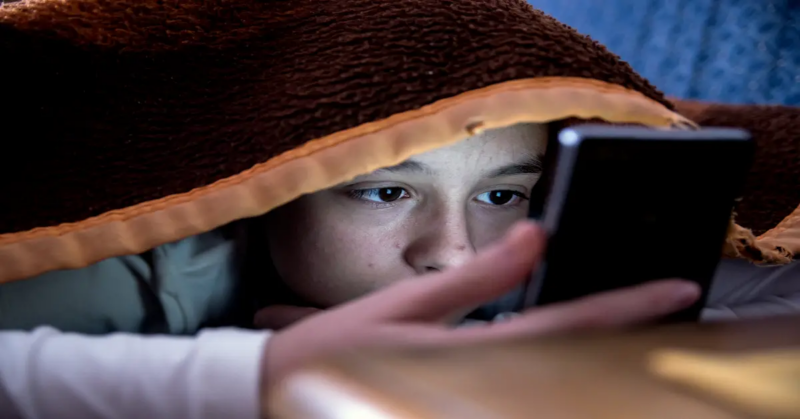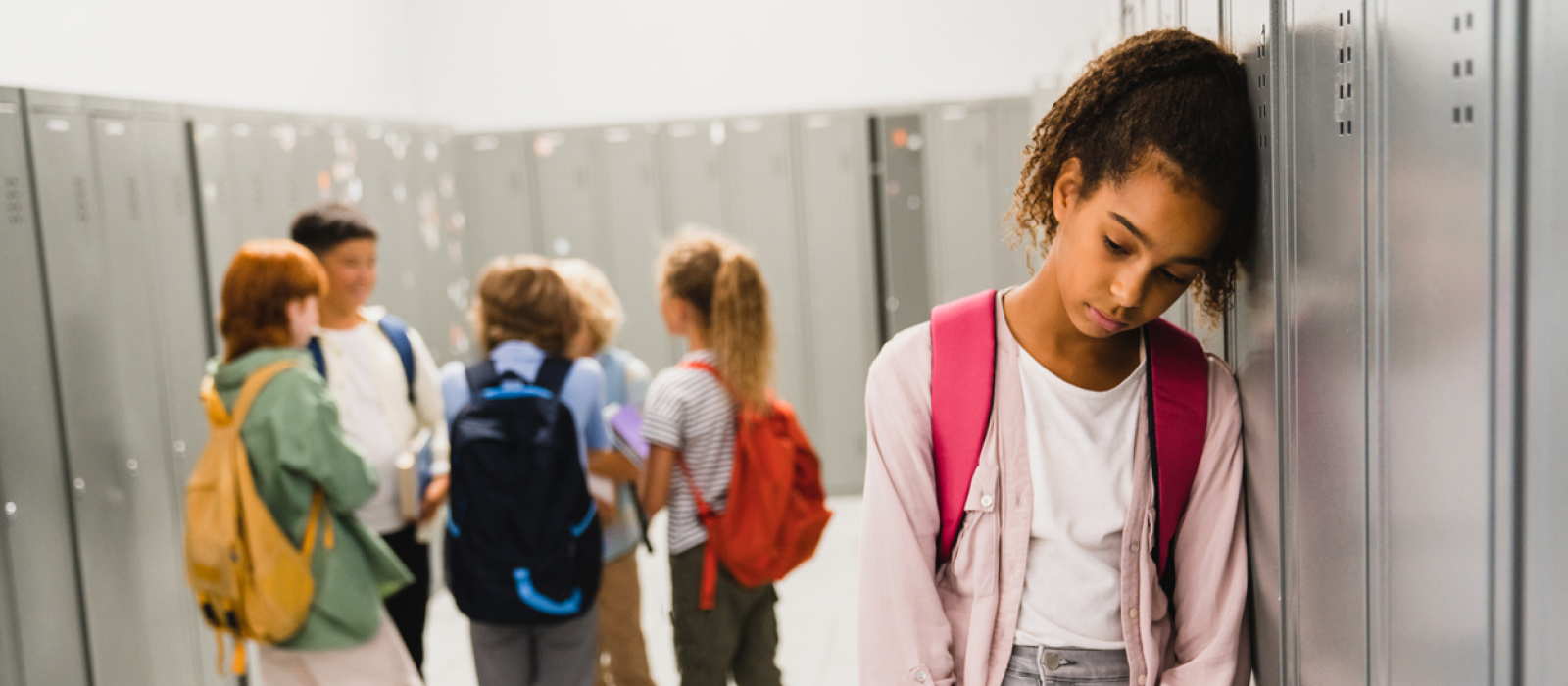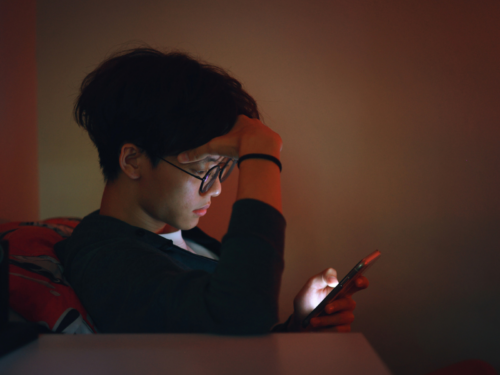
Table of Contents
How Being a Victim of Teen Bullying Can Affect Your Mental Health

Written By: Ashley Laderer

Clinically Reviewed By: Dr. Jaime Ballard
Updated: November 29, 2023
5 min.
Research shows teen bullying can have short-term and long-term effects on your mental health. Here’s what you can do about it.
Learn more about our Clinical Review Process
Table of Contents
Trigger warning: suicide. If you’re experiencing suicidal thoughts or are in danger of harming yourself, this is a mental health emergency. Contact The Suicide & Crisis Lifeline 24/7 by calling or texting 988.
Bullying, meaning any kind of intentionally aggressive behavior involving a power dynamic aimed at causing harm, can have mental health implications. You may experience sadness, embarrassment, fear, anxiety, and loneliness at the hands of a bully. In severe cases, being a bullied teen, along with other factors, may even lead to suicidal behavior. The effects of bullying can take a serious toll on a young person and their mental health, both now and later in life. Here’s what you need to know about bullying and its mental health impacts.

You’re not alone
Personalized mental health treatment for teens and young adults, from home.
How does bullying affect teen and young adults’ mental health?
Unfortunately, bullying of any kind (including verbal and physical bullying as well as cyberbullying) can cause a young person serious mental health issues if left unaddressed.
Since bullies go to great lengths to make you feel bad about yourself, bullying can cause your self-esteem and self-confidence to take a hit. Research shows that being the victim of bullying behavior, like name calling and insults, can lead young people to feel unlovable, less than others, and self-critical. Due to the loss of self-esteem, some young people might end up isolating themselves from others, which can ultimately exacerbate mental health concerns.
Being bullied can increase the risk of conditions such as depression and anxiety and lead to overall poor mental health, studies show. Substance abuse is another potential problem among victims of bullying. Researchers have found that people being bullied have a higher risk of using and abusing alcohol, cigarettes, and cannabis.
These risk factors can be long-lasting, particularly if people don’t take action to prevent bullying and mental health issues when they first arise. Research shows that kids and teens who were victims of bullying are more likely to be diagnosed with an anxiety disorder or depression in adulthood. The risk increases as the frequency and severity of bullying increase. Even more troublesome, the researchers found a link between being bullied and suicidal behavior in adolescence, stating that teens who were bullied were more prone to “having suicidal ideation, attempts, and completed suicides.” Further research has found that victims of bullying are also at higher risk for psychiatric hospitalization in adulthood due to poor mental health.
How common is bullying?
Teen bullying is sadly all too common. Although many schools do have bullying prevention programs in effect, the behavior still occurs often. Based on student surveys of 9th through 12th graders, it’s estimated that 20% of teens in the United States, or one in five, have been bullied in middle school and high school. According to the surveys, about 19% of respondents were bullied on school property—most commonly in the halls, classrooms, or cafeterias.
In-person school bullying isn’t the only battle teens have to face, though. Cyberbullying is also a concern, and it’s even more prevalent than in-person bullying. As many as 37% of 12 to 17-year-olds have been victims of cyberbullying, with some estimates putting the number even higher at six in 10.

Certain marginalized groups may be more prone to being a victim of bullying due to various prejudices. One recent survey found that the rates of identity-based bullying were highest in gender-diverse Black and Hispanic kids and teens. This includes people who identify as trans, genderqueer, or non-binary. Additionally, youths with disabilities are up to three times more likely to be a victim of bullying than non-disabled classmates, research shows.
How to take care of your mental health if you’re being bullied
As the above research shows, many people deal with teen bullying, and it can be detrimental to mental health. However, there are ways to take care of yourself to make sure you reduce your risk of future mental health issues. Taking care of yourself now and seeking mental health treatment when necessary will benefit both your current self and your future self. Here are four tips for taking care of your mental health while dealing with bullying.
1. Remember that you’re not alone
You are never alone, even though being a victim of bullying might make it feel like you are. Many others are going through what you’re dealing with, and it’s likely that if you open up to trusted friends about your struggles, they’ll be able to empathize and share similar stories.
2. Bring up the bullying to a trusted adult
If bullies aren’t intervened or specifically stopped, they’ll probably just keep on bullying. That’s why it’s so important to tell a trusted adult like a parent, teacher, counselor, therapist, principal, or school social worker. They can help safely address the school bullying or cyberbullying problem directly. This is key for future bullying prevention, too.
3. Practice self-care
Be kind to yourself and take care of yourself as you’re going through this tough time. Self-care looks different for everyone, but some ideas are:
- Calling up a close friend or family member for support
- Practicing mindfulness or meditation
- Being creative with art or music
- Journaling
- Getting enough sleep
- Eating a healthy diet
- Being physically active
4. Consider therapy
Many kids, teens, and young adults benefit from mental health treatment, such as individual therapy. Working with a mental health professional can give you an outlet to talk about the problems you’ve been facing, learn coping skills, and figure out healthy solutions. This can be especially helpful if you feel like you’re experiencing low self-esteem, anxiety, or depression. You may want to see if your school has a social worker or psychologist who you can work with.
Support for teen bullying victims at Charlie Health
If you’re dealing with mental health struggles as a result of teen bullying, Charlie Health is here to help. Our personalized, virtual Intensive Outpatient Program (IOP) offers more than once-weekly support for young people dealing with a variety of mental health issues, including the mental health effects of bullying. In addition to individual counseling and family therapy, Charlie Health clients are matched with a group of peers dealing with similar life struggles for supportive group sessions. Fill out this short form to get a free assessment and see if Charlie Health can help you on your healing journey.
References
https://capmh.biomedcentral.com/articles/10.1186/s13034-015-0075-2
https://www.ncbi.nlm.nih.gov/pmc/articles/PMC4552909/
https://www.ncbi.nlm.nih.gov/pmc/articles/PMC5487445/
https://www.ncbi.nlm.nih.gov/pmc/articles/PMC10061722/
https://pubmed.ncbi.nlm.nih.gov/33428081/
https://www.pacer.org/bullying/info/students-with-disabilities/
https://jamanetwork.com/journals/jamanetworkopen/fullarticle/2782217
https://www.dosomething.org/us/facts/11-facts-about-cyber-bullying





